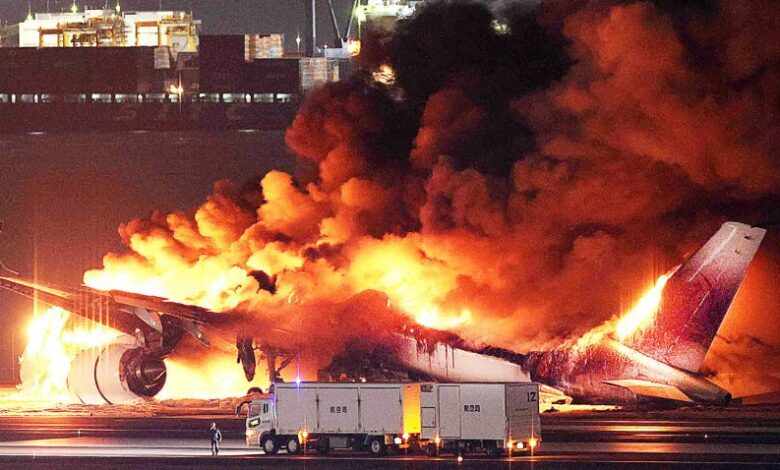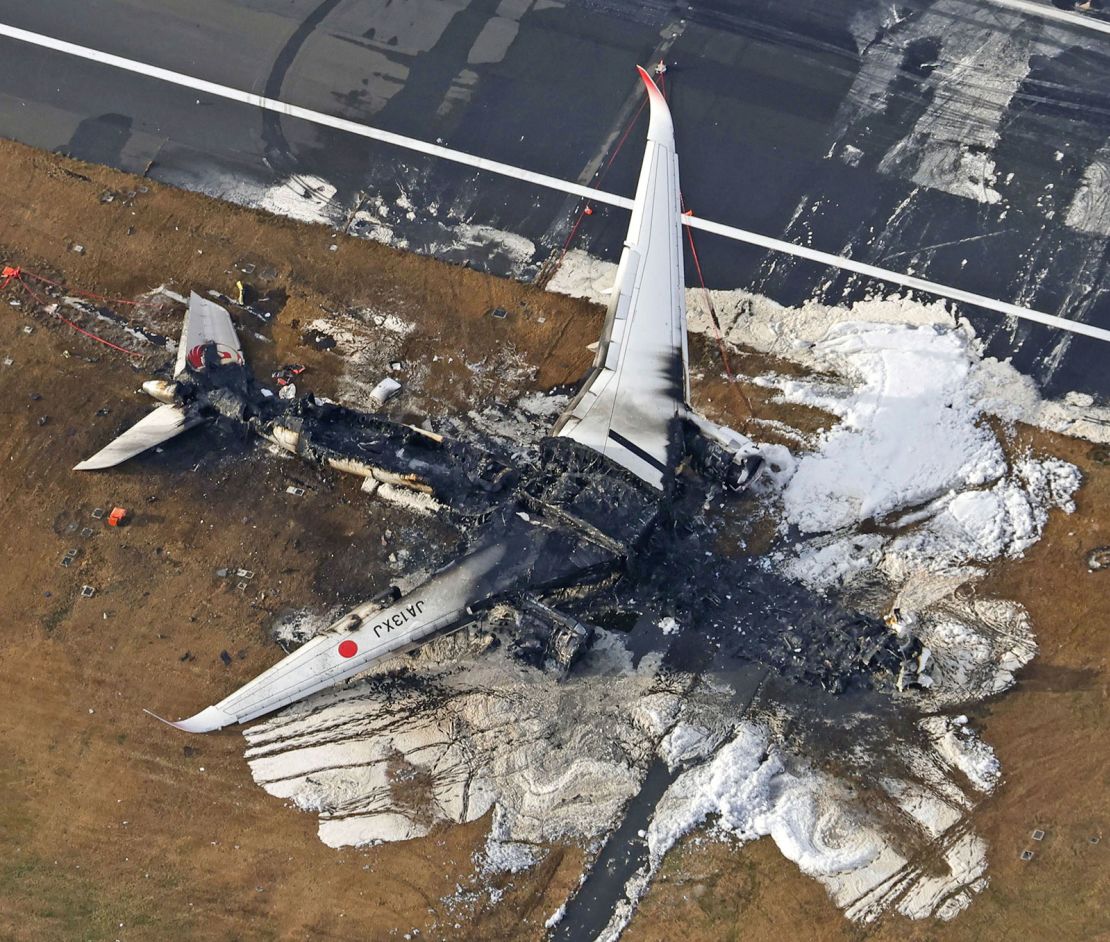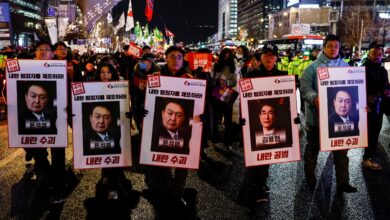
The fatal accident saw Japan Airlines flight 516 crash into the coast guard aircraft after touching down on the runway on Tuesday, causing it to erupt into a terrifying fireball.
All 379 people on the Japan Airlines (JAL) plane were safely evacuated in what has been hailed as a textbook response from crew and passengers. Five of the six crew members on the smaller coast guard aircraft died, according to Japanese Transport Minister Tetsuo Saito.
Saito on Wednesday released the transcript of more than four minutes of communications between air traffic controllers and the two planes immediately before the accident, which indicates the Japan Airlines flight had been given permission to land but does not show clear takeoff approval for the coast guard aircraft.
In a further development, publicly available records appeared to suggest that out-of-service warning lights – designed to stop pilots from erroneously taxiing onto the runway – could have been another factor in the crash.

Air traffic control gave the JAL passenger plane permission to land at 5:43:26 p.m. local time (3:43:26 a.m. ET), according to the transcript.
However, the transcript does not show clear takeoff approval for the coast guard aircraft, instead telling it to “taxi to holding point” at 5:45:11 p.m. (3:45:11 a.m. ET). The crew of the coast guard plane confirmed the instruction seconds later, according to the transcript.
About two minutes later, the JAL flight collided with the coast guard plane on the runway, according to the timestamp on airport surveillance video.
Saito, the transport minister, told reporters Wednesday that the incident is “still being investigated” and the next step will be to listen to the audio recording of the conversation between the coast guard pilot and flight control tower.
He added that the Transport Ministry is taking every precaution to prevent such an accident from occurring again.
In a briefing following Saito’s press conference, officials from the Japan Transportation Safety Board (JTSB) said they had retrieved the flight and voice recorders of the coast guard aircraft. However, they added that they were still looking for those of the JAL plane.
Another factor that could potentially be probed as part of the investigation into Tuesday’s collision is that the runway lights — known as runway stop bar lights and designed to stop pilots from erroneously taxiing onto the runway — may have been out of service, according to publicly available records.
A bulletin to pilots said stop bar lighting is “unserviceable” from taxiways C1 to C14, which includes the taxiway where Haneda tower controllers told the coast guard flight to hold and await takeoff clearance. The notice — or NOTAM — was first publicly posted on December 25, 2023, and remains active.
A JTBS official told reporters that the air traffic controller cleared the JAL plane to land on the runway and instructed the coast guard aircraft “to hold point.”
The release of the transcript comes after Japan Airlines said in a statement late Tuesday that its crew had been cleared to land by air traffic control prior to the collision.
Audio from LiveATC.net appears to detail the crew reading back a clearance order for the runway, saying “cleared to land 34 right.”
Japan Airlines has pledged its full cooperation in the investigation to determine responsibility for the deadly crash.
The company is expecting up to $100 million in losses following the accident, an airline spokesperson told CNN on Thursday. Over 100 of the airlines’ flights have been canceled since the incident, 50 cancelled on Wednesday and another 68 on Thursday.
Japan Airlines is also offering booking changes or ticket refunds for any passenger that wishes to do so for flights before March 31.
Jet evacuated in 18 minutes, NHK reports
Passengers who were onboard the Japan Airlines plane, an Airbus A350, as well as witnesses to the collision have described terror giving way to relief as it became clear everyone onboard survived.
Incredibly, Japan Airlines said only one person on board its plane received bruises, but 13 “requested medical consultation due to physical discomfort.”
New details have since emerged on the speed and efficiency with which the burning aircraft was evacuated.
It took 18 minutes to get all passengers and crew off the burning jet, Japanese public broadcaster NHK reported Thursday.
The network, citing JAL officials, said the pilots of the A350 were unaware that a fire broke out after the collision, but flight attendants noticed it as smoke began to fill the cabin.
Crew members urged passengers to remain calm as the crew chief reported the fire to the pilots and asked for permission to open the emergency exits, NHK added.
The jet had eight emergency exits, NHK reported, adding that evacuation began from two exits at the front that were safe from the fire and one exit at the back.
The captain was the last person to leave the plane at 6:05 p.m., 18 minutes after landing according to NHK.
CNN’s Helen Regan, Teele Rebane, Pete Muntean and Lauren Koenig contributed reporting.
This story has been updated with new developments.




